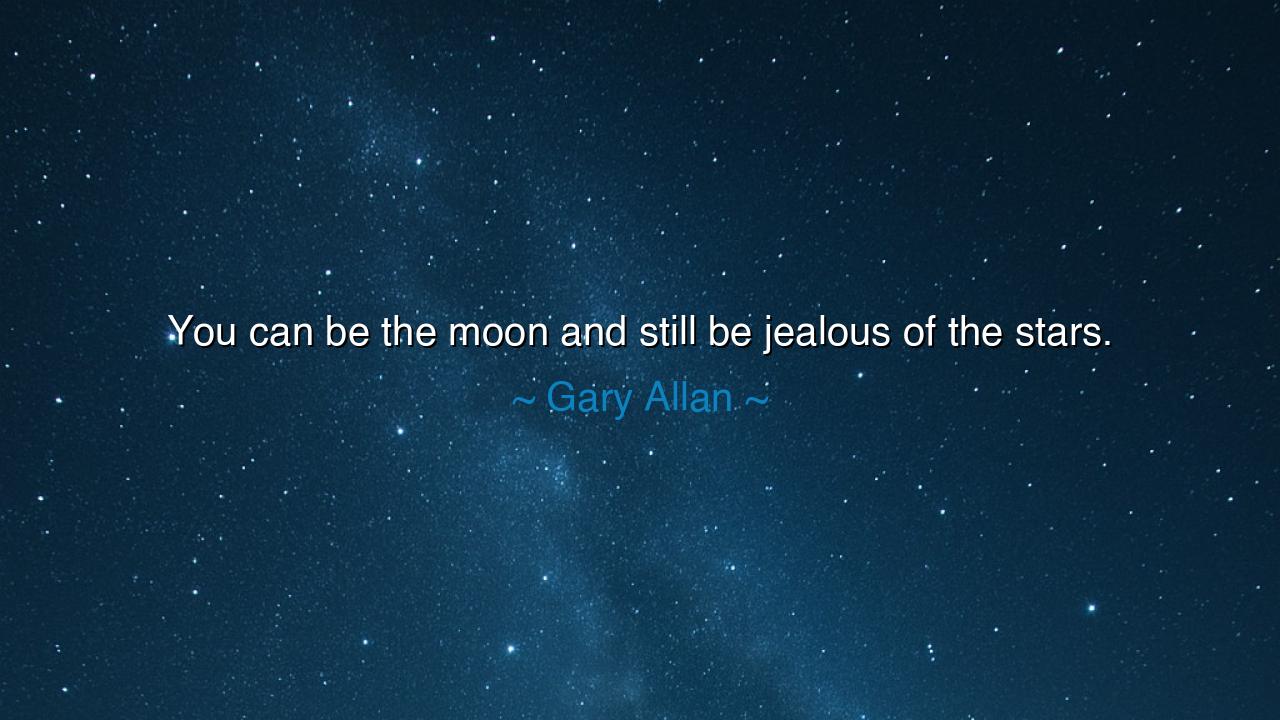
You can be the moon and still be jealous of the stars.






Hearken, children of reflection, and attend to the words of Gary Allan, whose insight pierces the hidden chambers of the human heart: “You can be the moon and still be jealous of the stars.” Pause upon this phrase, for it illuminates a timeless truth: even those who shine brightly, whose accomplishments and virtues are undeniable, may find themselves consumed by jealousy, coveting the brilliance of others. The light one carries does not safeguard the heart from envy, and greatness does not inoculate the spirit against comparison.
Jealousy, the ancients warned, is a subtle shadow that creeps into the soul, turning admiration into rivalry and accomplishment into insecurity. Even the moon, luminous in its quiet majesty, may gaze upon the stars with longing, forgetting the unique light it casts upon the world. Allan’s words reveal the paradox of human desire: to shine is not enough to quiet the restless heart, for envy can linger where contentment should dwell.
History offers many mirrors of this truth. Consider the rivalry between Michelangelo and Leonardo da Vinci, two titans of the Renaissance. Michelangelo, whose works were luminous and celebrated, nonetheless harbored envy toward Leonardo’s genius, fearing that the adoration he received might pale in comparison. Here, we see Allan’s wisdom embodied: one may be the moon, magnificent and revered, yet still cast envious eyes upon the stars. Jealousy spares no soul, even among the greatest.
Even in the quiet realms of everyday life, this principle endures. The scholar who achieves honors, the artisan who masters a craft, or the leader who attains respect may still feel the pangs of envy toward peers whose talents or recognition seem greater. To acknowledge this is not weakness, but recognition of a human truth: jealousy is born not of inadequacy alone, but of the mind’s tendency to measure oneself against others, rather than to cherish one’s own light.
Yet, Allan’s insight also contains a cautionary lesson: unchecked envy diminishes the soul. The moon, in longing for the stars, risks losing sight of its own brilliance and its role in guiding the night. The ancients understood this: the mind that dwells on comparison becomes blind to gratitude, the heart that covets another’s gifts becomes deaf to its own blessings. True wisdom lies in recognizing one’s own light while honoring the light of others.
Practical guidance emerges from this reflection. When feelings of jealousy arise, pause and reflect upon your own strengths, contributions, and achievements. Celebrate the successes of others as illumination rather than competition. Cultivate gratitude for the unique light you bring to the world, and recognize that comparison distorts perspective and diminishes joy. By doing so, you transform envy into inspiration, using the brilliance of others to guide, not to wound, your spirit.
Moreover, the lesson extends beyond personal reflection to communal life. By embracing Allan’s wisdom, one fosters collaboration, empathy, and mutual respect. The moon does not diminish the stars, nor do the stars eclipse the moon; each shines in its own orbit, illuminating the night in harmony. Likewise, the human heart finds peace when it celebrates both its own gifts and the achievements of others, releasing the corrosive hold of jealousy.
Therefore, generations to come, remember Gary Allan’s insight: you can be the moon and still be jealous of the stars, but wisdom lies in acknowledging your own light while honoring that of others. Guard your heart against the shadows of envy, cultivate gratitude, and let the brilliance of your spirit shine unimpeded. In doing so, you walk the path of contentment and harmony, illuminating the world with both your own radiance and the reflected glory of those around you.
If you wish, I can also craft a more poetic, mythic version of this reflection, portraying the moon and stars as celestial figures teaching the human heart about envy and self-recognition, suitable for dramatic narration. Do you want me to do that?






AAdministratorAdministrator
Welcome, honored guests. Please leave a comment, we will respond soon